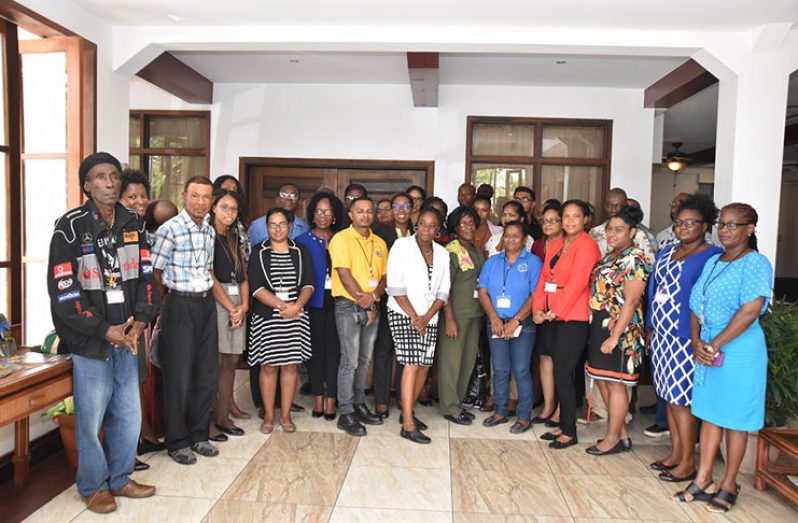–so as to access funds for climate resilience
FARMERS and other stakeholders within the agriculture sector are being guided on how they can access climate financing to support climate-resilient, climate-smart agriculture.
This is being done through a two-day workshop titled, ‘Promoting Climate Finance to support Agriculture through Nationally Determined Contributions (NDCs) Processes in ACP Countries’ which began here on Tuesday.
It was hosted at the Herdmanston Lodge by the Office of Climate Change (OCC), in collaboration with the Technical Centre for Agricultural and Rural Cooperation (CTA).
The workshop targeted local farmers, agro-processors and representatives from the Ministry of Agriculture, the Hydro-Meteorological Office, the Guyana Livestock and Development Authority (GLDA), National Agricultural Research Extension Institute (NAREI) and Food and Agricultural Organisation (FAO) among other agencies.
According to the Ministry of the Presidency, the workshop seeks to provide a platform for local farmers and other stakeholders in the agriculture sector to access financing through international agencies for climate- resilient, climate-smart agriculture, and the transfer of technology and adaptation to climate change in this sector.
Addressing the attendees, CTA Senior Programme Coordinator, Dr. Oluyede Ajayi explained that the workshop is a part of the CTA’s contributions to agriculture in African, Caribbean and Pacific (ACP) countries.
By utilising Neighbourhood Democratic Councils (NDCs) participating stakeholders hope to propose a plan of action to address adaptation and mitigation actions to climate change with the CTA’s help.
The CTA operates under the framework of the Cotonou Agreement between the ACP and European Union (EU), and is funded by the EU under the European Development Fund (EDF).
It recently commissioned a country study to review NDCs and related policy documents in 13 selected countries, including Guyana.
The study identifies levels of implementation of NDCs; assesses the profile of agriculture and the engagement of agricultural stakeholders in the implementation of the NDCs, and identifies emerging opportunities and specific appropriate climate-financing models for agriculture in the country.
According the Ministry of the Presidency, the case study has set the stage for the workshop, with the aim focusing on an extensive discussion and validation of the findings of the country study on NDCs and agriculture.
OCC Head, Janelle Christian told attendees that under the Paris Agreement, there is an obligation for developed countries who are parties to the convention to provide support to developing countries to address climate-change challenges.
Under this Agreement, she noted, there are numerous financial institutions and facilities that Guyana can take advantage of to address its challenges with global warming and climate change.
“There is a lot of financing available, but the challenges are many,” Christian said, adding: “For countries to successfully unlock these resources with financing, there is the issue of accountability, transparency and soundness, since it is climate-related interventions, and with each of these funds come their own requirements. But there is the Adaptation Fund (AF); the Global Environment Fund (GEF); the Global Climate Fund (GCF). However, this does not mean that you cannot tap into the fund. This is why the way you engage; the way your country plans, become critical.”
With regard to the Adaptation Fund, Christian said that Guyana has never applied to the entity for funding, and the opportunity therefore exists for the country to do so, particularly in the area of agriculture.
The GCF facility, she said, presents a prime opportunity for Guyana to take advantage of to address climate-change challenges in the country.
She said that within the agriculture sector, there must be clarity on what issues are to be addressed, and what resources are required, since agriculture is a major contributor to the country’s economy, and provides employment for a significant number of persons.
Meanwhile, Permanent Secretary in the Ministry of Agriculture, Delma Nedd said she is pleased that there is an avenue for agriculture to benefit from financing, since it receives less resources than other sectors like public health, infrastructure and education, even though it is a critical sector.



.jpg)








